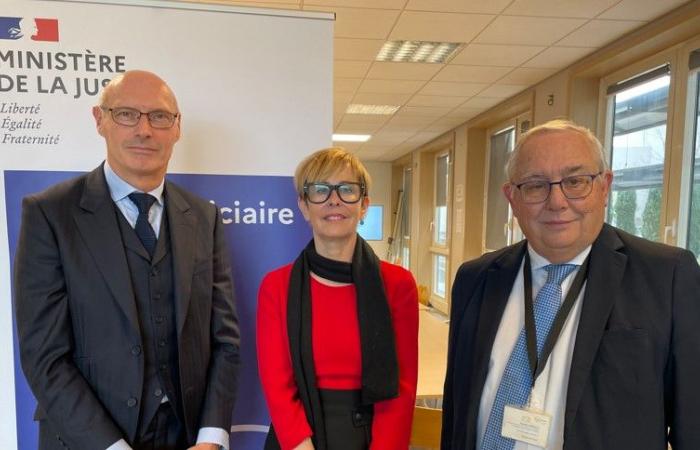It is at the initiative of the president of the Avignon judicial court Jean-Philippe Lejeune, Florence Galtier public prosecutor at the Avignon judicial court and Gérard Arnault president of the commercial court that Avignon is one of the 12 commercial courts soon called 'economic activity courts'. Assignment ? Handle amicable and collective procedures for the entire department regardless of the activity carried out. This reform will relieve the legal courts of Avignon and Carpentras.
There will now be 12 courts carrying out this national pilot operation, the aim of which is to absorb certain powers of the judicial court such as safeguard procedures, judicial reorganizations, judicial liquidations and amicable procedures (amicable agricultural settlements, mandates for this and conciliations) of all activities, with the exception of regulated legal professions: lawyers, notaries and court commissioners.
An experiment carried out over 4 years
The creation of economic activity courts falls within the framework of the Ministry of Justice Orientation and Programming Law No. 2023-2027, and will be tested for a period of 4 years from 1is January 2025, to then be possibly extended to the entire country. Objective ? Declutter the judicial courts, increase efficiency, give more clarity to litigants and reduce the cost of justice.
The new economic activity courts
The commercial courts designated by the Keeper of the Seals, Minister of Justice, to experiment with the Economic Activities Courts (TAE) are: Avignon, Auxerre, Le Havre, Le Mans, Limoges, Lyon, Marseille, Nancy, Nanterre, Paris, Saint-Brieuc and Versailles. Cases already in progress remain within the jurisdiction of the judicial court to continue to be processed there. Note that the Avignon economic activities court is the only one in France which will absorb the jurisdiction of two judicial courts: Avignon and Carpentras.
A new organization scrutinized by a committee of experts
In accordance with Decree No. 2024-674 of July 3, 2024, this new organization will be examined by a Committee of experts and parliamentarians responsible for submitting an evaluation report to Parliament before July 1is July 2028. The completed experiment could be generalized throughout France. A satisfaction questionnaire, intended for litigants, will be available within each economic activities court. That of Avignon is made up of 42 consular judges of the commercial court, 6 judges practicing the profession of agricultural operators and clerks of the commercial court.
Who does this concern or not?
Any professional experiencing economic difficulties: associations, farmers, civil societies, liberal professions. Those that the TAE will not concern? Lawyers, notaries, justice commissioners, commercial court clerks, judicial administrators and legal representatives.
For which procedures?
Amicable procedures: amicable agricultural settlements, mandates for thisconciliations; collective procedures: safeguards, judicial recovery, judicial liquidations; actions and disputes relating to commercial leases arising from the collective procedure and presenting with it sufficient links of connection and intellectual property.
Why this reform?
Until now, the judicial courts and commercial courts dealt with amicable and collective procedures in competition, depending on the activity of the debtor. From now on, there will only be one specialized jurisdiction to deal with the matter.
Who will be part of the Steering Committee?
The experiment is conducted by a Steering Committee composed of 1° the director of judicial services; 2° of the director of civil affairs and the seal; 3° a first president of a court of appeal in whose jurisdiction an economic activities court has its seat; 4° a public prosecutor at a court of appeal in whose jurisdiction an economic activities court has its seat; 5° a president of a judicial court in whose jurisdiction an economic activities court has its seat; 6° a public prosecutor near a judicial court in whose jurisdiction an economic activities court has its seat; 7° a president of an economic activities court; 8° a registrar of an economic activities court; 9° a judicial administrator; 10° a legal representative; 11° of a president of the bar association in whose jurisdiction an economic activities court has its seat; 12° a member of a departmental chamber of agriculture; 13° of the president of the general conference of consular judges of France; 14° of the vice-president of the national council of commercial courts; 15° of the president of the national council of commercial court clerks. The director of judicial services and the director of civil affairs and the seal co-chair this committee. The persons mentioned in 3° to 12° are appointed by order of the Keeper of the Seals, Minister of Justice.
Copyright MMH
They said
“This simplification is very important, particularly given the specificity of our Department which is very rural and has many farmers, particularly in Carpentras and its surroundings,” explained Jean-Philippe Lejeune, president of the Avignon judicial court, specifying, on the 12 courts chosen to be pilots, the Avignon commercial court will be the only one to absorb the activities of two judicial courts: Avignon and Carpentras.
Why was the Avignon court chosen?
“Because we brought together several criteria: a rural department with numerous agricultural and wine-growing operations, small and medium-sized businesses, large companies, liberal professions and numerous associations,” underlined Gérard Arnault, president of the Avignon commercial court. .
The Evaluation Committee
“The Evaluation Committee will meet three times a year,” explained Florence Galtier, public prosecutor. It will allow us to regularly analyze the situation and alert us to the type of difficulties encountered, even if the procedure remains the same. This reform aims to simplify and transfer skills and responsibilities because 90% of professions come under the jurisdiction of the economic activities court, however we have not yet assessed the volume of cases that this represents.”
Proud to have been chosen as a pilot site
“It was all three of us, together, that we nominated the Avignon commercial court as a court for economic activities. Our department really seemed destined for this experiment and the Avignon commercial court works very well,” concluded Jean-Philippe Lejeune, president of the Avignon judicial court, Florence Galtier, public prosecutor at the Avignon judicial court and Gérard Arnault, president of the Avignon commercial court.







